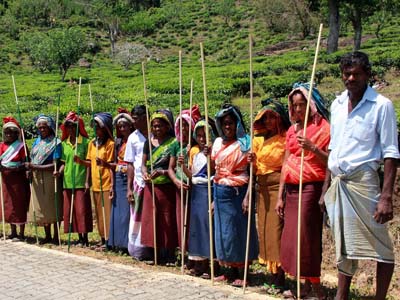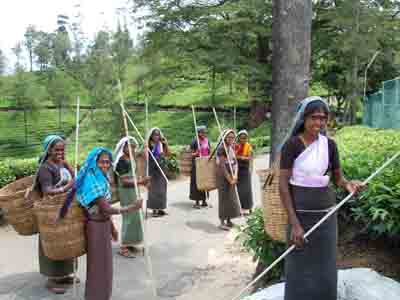Planters’ Association stands firm on final wage offer, productivity linked
 The Planters’ Association of Ceylon (PA) firmly maintained that its membership is not financially able to afford demands made by worker trade unions for a daily wage of Rs. 1,000 and strongly cautioned stakeholders that any increase above the Rs. 940 wage proposed by RPCs would place the continuity of the industry in serious jeopardy. The Planters’ Association of Ceylon (PA) firmly maintained that its membership is not financially able to afford demands made by worker trade unions for a daily wage of Rs. 1,000 and strongly cautioned stakeholders that any increase above the Rs. 940 wage proposed by RPCs would place the continuity of the industry in serious jeopardy.
Negotiations over a new Collective Agreement have reached a complete deadlock despite the industry having made three concrete offers, each of which has been rejected by the trade unions who demand Rs. 1,000 per day plus EPF/ETF regardless of productivity, noted the Association.
“We all want to find a way to maximize the earning potential among estate-sector workers but all stakeholders have to understand the criticality of the current circumstance and understand the long term sustainability of the industry which millions of livelihoods depend on. On this we stand firm and we urge the Trade Unions to come to a common understanding on this basic fact,” PA Chairman, Sunil Poholiyadde stated.
Under the previous collective agreement, workers were provided a basic salary of Rs. 500, in addition to an attendance inventive (AI) of Rs. 60, a Productivity Incentive (PI) of Rs. 140 and a Price Share Supplement (PSS) of Rs. 30 and EPF/ETF of Rs. 75, amounting to a total daily wage of Rs. 805.
As of its last and final offer, the RPCs have proposed a 20% increase on the basic wage up to Rs. 600, a 33% increase in the AI up to Rs. 80, and a 20% increase in ETF/EPF up to Rs. 90 in addition to the PI and PSS, leading to a maximum total daily wage of Rs. 940, amounting to an average increase of Rs. 3,375 per month per worker.
Additionally, tea harvesters who are able to bring in harvests above the norm of 16-18 kgs will continue to be entitled to over-kilo pay which is currently at Rs.28.75 per every kilo in excess of the plucking norm. In this manner, a worker who plucks even 3 kilos above the norm can expect a daily pay of over Rs 1,000/-.
The current plucking average in Sri Lanka is 18 kilos with harvesters working for approximately 40% of an 8 hour day in the field and where men typically work for only 4 hours per day. Even then, more than 80% of RPC workers receive the Performance Incentive (PI) on their daily norm. In companies that have offered cash plucking on such a basis, the PA stated that the 15-20 kilo norm was achieved in just 2 hours.
By comparison, the plucking average in Sri Lanka’s largest competitor nations, Kenya, stood at 60 kgs, South India at 50 kgs and Assam with 36 kgs, where the norms in those nations had been set at 40 kgs, 34 kgs and 24 kgs respectively. By comparison, the daily labour wage in Kenya stood at Rs. 443.3, South India at Rs. 487.2 and Assam at Rs. 342 against Rs. 805 in Sri Lanka in 2016.
The PA further stated that if workers were to be given a Rs. 1,000 daily wage as currently demanded by the Trade Unions, the only way such a value would be at all feasible was if the industry shifted entirely into a productivity based wage model. In the tea sector, this would mean that Rs. 46 would be paid for every kilo of tea harvested; transforming the way a worker would be remunerated, from the current model.
“It is undeniable to anyone that Sri Lanka suffers from the highest cost of production and that the largest contributing factor is low labour productivity. We have tried to introduce dynamism into this system through the introduction of productivity incentives that could enhance RPC revenues and therefore support sustainable wage increases and investing into modernisation in operations.
“RPC’S are not denying a wage increase; however there must be consideration for financial viability. Meanwhile, current market dictates and prices at the Colombo auctions have shown a downward trend. Raising productivity is an absolute must which the trade unions accepted at the last negotiations with the inclusion of a productivity incentive in the wage package. Therefore it is essential that the wage is linked to productivity in order for the sustainability of the industry and the national economy as whole. We should collectively work towards the long-term sustainability of the industry,” emphasized Sunil Poholiyadde.
 Notably RPCs continue to pay their employees well above the legal National Minimum Wage of Rs. 10,000 per month. Even now RPC workers are among the highest paid when compared with the Tea Smallholder sector and garment industry. Notably RPCs continue to pay their employees well above the legal National Minimum Wage of Rs. 10,000 per month. Even now RPC workers are among the highest paid when compared with the Tea Smallholder sector and garment industry.
Meanwhile, the tea smallholder sector which despite accounting for 76% of national green leaf production, offers a minimum of Rs. 26 per kilo of green-leaf without EPF, ETF, maternity benefits, gratuity , holiday pay, attendance bonus pay, profit share, total maternal care, day care and all the other benefits offered by RPCs to their workers in addition to the compulsory 300 days of work offered per year irrespective of the output of the workers, weather conditions, crop availability and the viability of the estates.
In this round of negotiation, other commodities such as Rubber must also be considered, where the auction prices for Rubber have rapidly declined to an all time low of less than Rs 300/- which 6 years ago was over Rs 600/-.The Cost of Production (COP) against the current auction price is approximately Rs 75 – 100/- higher.
If the RPCs final offer is accepted, the impact of the increase in terms of gratuity payments alone will be in excess of Rs. 5 billion to the industry, in excess of Rs. 300 million will be added to the Cost of Production (COP) of the RPC’s.
In view of the above and in accommodating the Trade Union’s request, based on the rising cost of living, the RPC’s current proposed wage hike will strike a balance for both the worker and the Company, despite the RPC’s having to navigate in very difficult conditions.
Released in November 2018
|